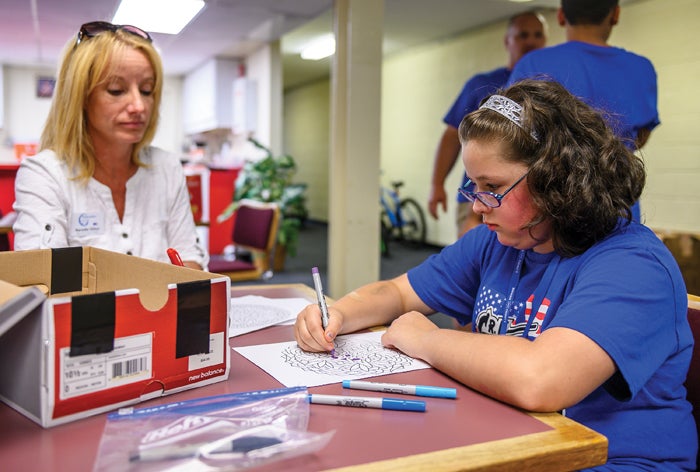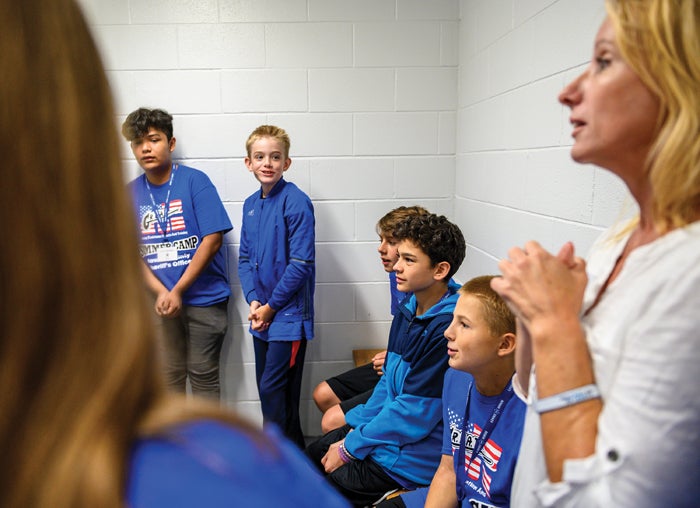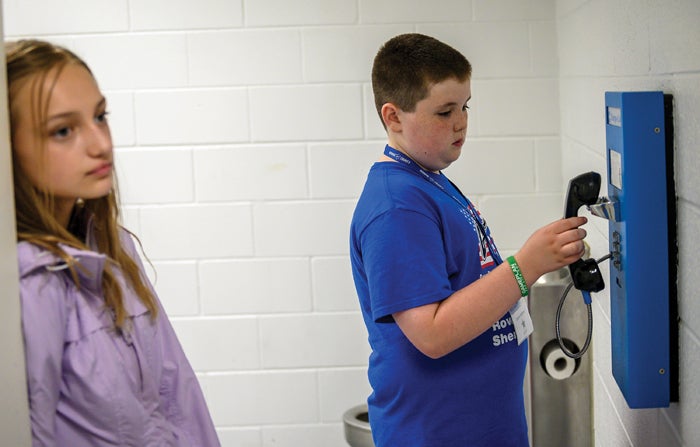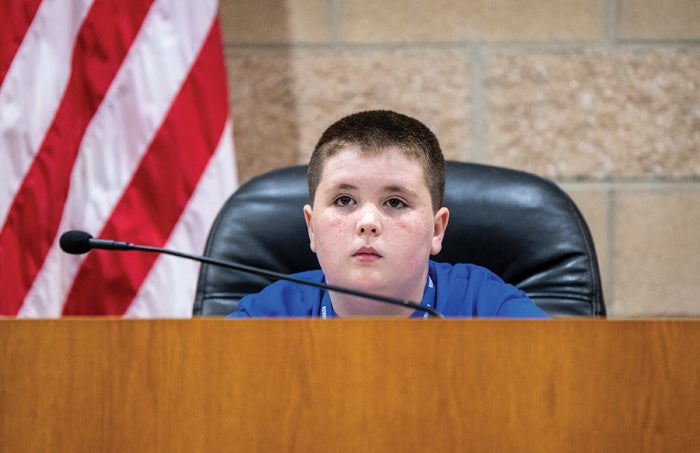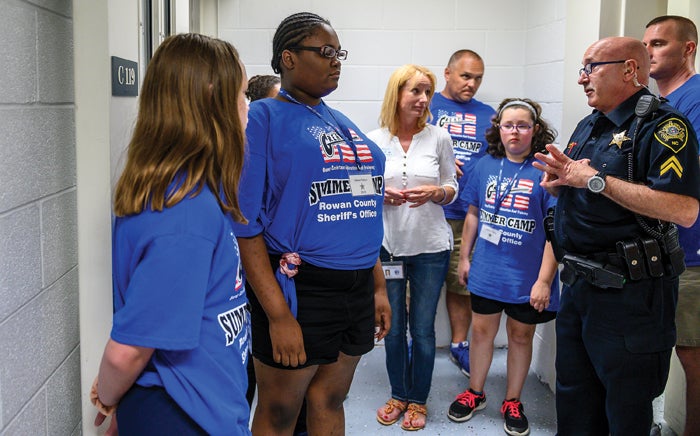Organizations partner to benefit youth across Rowan County
Published 12:00 am Friday, June 21, 2019
SALISBURY — In the dining room of First Baptist Church’s Family Ministry Center, rising eighth-grader Sara Portscheller sits at a table and excitedly introduces her surrounding friends. There’s Kimberly, Gabbie, and school resource officers Jonathan Reep and Ryan Walker.
Though the middle school students may vary dramatically from the law enforcement officers joining them, each label of “friend” comes easily for Sara. This is her second year at the Rowan County Sheriff’s Office’s GREAT Camp, an annual offering whose name stands for “Gang Resistance Education and Training.”
It may be a stern-sounding acronym, but the summer program is nothing but positive, said Officer Walker. The camp, which was started five years ago as his brainchild, offers a week of free summer enrichment for fifth- through eighth-graders with a focus on fostering trust between students and law enforcement.
“We wanted to provide kids with an alternative safe environment,” said Walker. “This camp provides interaction with law enforcement in a purely positive light. … We’re not in our uniforms. They get to know us on another level and see that we’re human.”
Throughout each week of camp, about 30 students join officers for experiences like trips to Lazy 5 Ranch, a movie theater, Discovery Place or Carowinds. According to Walker, the interaction dispels misconceptions and helps students understand that emergency responders are there to help, not harm.
“For some students we see through camp, their first experience with law enforcement may not have been a good one,” he said. “They see us as the one who come to take their mother or father away. Camp helps them see we’re not bad guys breaking up families.”
According to Sheriff Kevin Auten, the camp is just one of many purposeful and ongoing interactions between officers and students across Rowan County. Together with partnering organizations like the Rowan/Kannapolis ABC Board and the Youth Services Bureau, Rowan learners engage year-round in programs that promote resilience and responsibility through role models.
Rowan/Kannapolis ABC Board brings Game Plan for Life
Sitting at his desk at the Rowan/Kannapolis ABC Board, general manager Terry Osborne puts the work of the local board into numbers: There are 168 ABC systems across the state, and only about 20 handle their required funding for education in ways similar to Rowan/Kannapolis, he said.
Each system, said Osborne, is required to filter at least 7% of its proceeds to education.
“Most just simply hand a check to the superintendent,” Osborne said. “But then there’s no way of knowing where that money goes, what impact it has.”
So Rowan/Kannapolis filters its funding in a different way: by footing the bill for programs like Joe Gibbs’ Game Plan for Life, a ministry that brings speakers into local schools. These speakers — some athletes, some musicians, some actors — have each overcome obstacles such as alcohol and drug addiction, injuries or bullying.
In the face of their struggles, the Game Plan for Life speakers have risen above to achieve successful careers in their industries or as motivational speakers.
“The overall theme is just to try to get kids focused and understand that they need direction,” said Auten.
He and his officers often attend Game Plan for Life assemblies, again there as faces for positive interaction — or often, he said, points of contact for conversation after the presentation.
Its all part of a collective effort to address the ever-changing problems faced by today’s youths, said Osborne.
“We’ve involved every entity imaginable,” said Osborne. “The issues over the years have changed. First it was alcohol, then it was the opioid thing. Now it’s a combination of things.”
This combination of struggles ranges from cyberbullying to vaping to hemp and CBD oil, said Auten and Osborne.
And the age of experimentation continues to get younger as opportunity and stress abound.
“Experimentation with alcohol is, on average, beginning between 12.5 and 13 years of age now, and it continues to lower,” said Osborne. “That’s gone down about two years since we started programs like these 16 years ago.”
Nanette Dillon, with the Youth Services Bureau and Game Plan for Life, said the program opens the opportunity for conversation among students, presenters and organizers. It focuses on a central theme: Young people’s decisions equal their destiny, she said.
By hearing from and engaging with speakers and organizers, students learn ways to respond in the face of adversity or temptation.
It is all part of a collective effort by the three organizations, she said.
“It’s not as if we just have this one program that we do. We bounce off of all of them in their entirety.”
Working together
Back at GREAT Camp, students have made the trek from First Baptist’s campus to the Rowan County Courthouse, where Dillon leads them through the process of teen court.
Teen court, offered as an alternative to the juvenile justice system, brings young, first-time offenders in front of a jury of peers. In the group, offenders will work to identify appropriate restitution for offenses like fighting, theft or communicating threats.
The group setting works to benefit both jurors and offenders, said Dillon — they see that they’re not the only ones struggling with issues between family members or among school peers. And they can pick up ways to respond in times of challenge, she said.
Her short tour of the process represents an educational component of GREAT Camp and just a fraction of the complex intermingling of organizations working to benefit young learners across the county.
For Sara Portscheller and her friends, the wide array of opportunities and experiences offers nothing but room to grow.
Sara points to North Rowan Middle School resource officer John Reep as her motivation for attendance two years ago, but Reep credits her for the extended invitation.
“When I look for students to invite to participate, I’m mainly looking for the kids who are enthusiastic,” he said. “I want the ones who are wanting to participate, to make friends and do things without their phone.”
And Sara is a prime example — taking lessons she learned that first year at camp to help others in the second year.
“Last year when she came, she was the only one from her school that week,” Reep said. “But she was able to use that on day one this year, when another student was crying and alone. She went up to her, made her feel included. She said she wouldn’t have come back the next day if it hadn’t been for her.”


